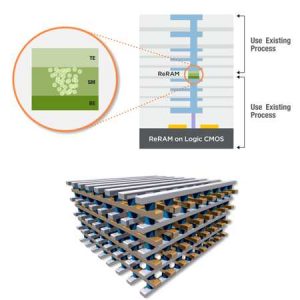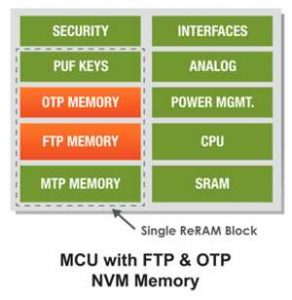CrossBar ReRAM Use
For FTP and OTP memory applications
This is a Press Release edited by StorageNewsletter.com on October 18, 2021 at 2:02 pmCrossBar Inc. announced applications of its Resistive RAM (ReRAM) technology for use in few-time programmable (FTP) and one-time-programmable (OTP) NVM applications.
While historically utilized as a high-performance, high-density multi-time programmable (MTP) non-volatile embedded semiconductor memory, the company’s ReRAM technology is being used for FTP and OTP memory applications.
“CrossBar partners are beginning to utilize our high-performance ReRAM not only for embedded MTP non-volatile memory and PUF security applications, but also for typical FTP and OTP applications,” said Mark Davis, president and CEO. “We’ll satisfy this initial demand with our current ReRAM technology, but also can optimize our ReRAM for FTP and OTP applications, increasing memory density and reducing cost while maintaining the many benefits of CrossBar’s unique filament based ReRAM technology.“
FTP and OTP typically operate as NVM with the ability to be written only a few times (FTP) or exactly once (OTP). This type of memory is utilized for program/boot code or data unique to each semiconductor such as trim bits or chip IDs. FTP/OTP technologies such as electrical fuse, anti-fuse or floating gate often have disadvantages such as single write cycle limitations presenting difficulties in detecting bad bits, requiring complex operational circuitry and having lower density/higher cost. In addition, existing FTP/OTP technologies may require high programming voltages resulting in higher leakage current in standby mode.
The firm’s non-volatile high-performance MTP ReRAM can also be used for FTP and OTP applications, eliminating many of these disadvantages. ReRAM can be written multiple times (typically 100,000 to 1 million writes) without many of the drawbacks of current OTP and FTP technologies.
Since MTP, FTP, OTP memories and physical unclonable function (PUF) keys are able to share a monolithic ReRAM manufacturing process and control circuity, it’s possible for a single chip design to be customized by dynamically reallocating memory during test time or at run-time, offering customers additional flexibility.
The company’s ReRAM technology is enabling a new class of computing, addressing the needs of high-performance, high-density MTP as well as FTP, OTP memories and PUF keys for security applications, which is especially useful for foundry nodes smaller than 28nm where embedded NVM is not readily available.
Resources:
CrossBar fact sheet
ReRAM FTP/OTP

















 Subscribe to our free daily newsletter
Subscribe to our free daily newsletter

